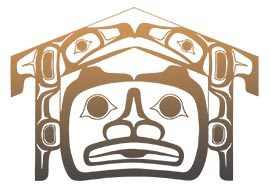
X̱wi7x̱wa library
X̱wi7x̱wa library is housed within a unique building on campus, made to represent an Interior Salish pit house, or kekuli. X̱wi7x̱wa’s collections predate the construction of the library and the First Nations House of Learning, but the library was gifted the name X̱wi7x̱wa in May 1993 by Chief Simon Baker.
The mandate of X̱wi7x̱wa Library is to “echo” the voices and philosophies of Indigenous people through its services, collections, and programs.
It is completely dedicated to Indigenous materials from Indigenous perspectives, and over the past 30 years, X̱wi7x̱wa has been a leader in Indigenous librarianship and supporting Indigenous research. The library is known for:
- one-of-a-kind collections that privilege Indigenous perspectives
- a unique Indigenous classification system and subject headings
- librarians and staff knowledgeable about Indigenous content and Indigenous librarianship
- support for Indigenous data sovereignty and Indigenous-led research
- support for Indigenous critical literacy and education
Collections
X̱wi7x̱wa’s collection dates back to 1970 and the creation of NITEP (Indigenous Teacher Education Program) at UBC.
In response to Pierre Elliot Trudeau’s 1969 White Paper, the Indian Association of Alberta issued the Red Paper, which called for increased control over a variety of issues, including education. UBC then opened the Indian Education Resource Centre (IERC). The IERC held materials that Indigenous teachers could come and consult, in order to develop curriculum for their own communities. In 1974, NITEP (the Indigenous Teacher Education Program) was created at UBC, and the NITEP reading room absorbed the IERC collection. The NITEP reading room eventually became X̱wi7x̱wa library.
The heart of the library is education: we have puppets, curriculum materials, and children’s books, but X̱wi7x̱wa has since expanded its collections to many topics. The collections currently comprise approximately 12,000 items including about 6,000 books, 450 videos, 5,000 vertical file materials, curriculum resources, journals and newspapers, maps, posters, theses and dissertations, the G.A. (Bud) Mintz special collection, and some archival materials.
[youtube]https://www.youtube.com/watch?v=Pptz1Jer820[/youtube]
Brian Deer Classification
A library’s classification system determines an item’s physical location on the shelf. Each item in the library is assigned to one general “class” of knowledge in the classification system. Items of the same class or similar classes are shelved together. The classification is indicated by a call number, usually placed on the outside of an item (e.g. a label on a book’s spine).
X̱wi7x̱wa Library uses a British Columbia variant of the Brian Deer Classification System, developed by Kahnawake librarian Brian Deer in the 1970s for the National Indian Brotherhood (now the Assembly of First Nations). To learn more about Brian Deer, this article by Jean Weihs was published in tribute to him shortly after he died in 2019. Relevant publication and information about X̱wi7x̱wa’s system can be found on our website here, and you might also check out the Indigenous Librarianship LibGuide for additional resources about the classification system. X̱wi7x̱wa Library’s modified Brian Deer Classification System was developed by founding librarian Gene Joseph (Wet’suwet’en – Nadleh Whut’en).
Below is a video from Karleen Delaurier-Lyle, Information Services Librarian at X̱wi7x̱wa, explaining practices of Indigenous Information Gathering at X̱wi7x̱wa Library:
[youtube]https://www.youtube.com/watch?v=AWb8Fe085Cg[/youtube]
Indigenous Librarianship
“Indigenous librarianship unites the discipline of librarianship with Indigenous approaches to knowledge, theory, and research methodology.”
Burns, K., Doyle, A., Joseph, G., & Krebs, A. (2009)
X̱wi7x̱wa library has made significant contributions to the field of Indigenous librarianship, as Canada’s only Indigenous branch of an academic library. It is frequently referenced in publications about Indigenous classification, education, and ways of knowing. Librarians at X̱wi7x̱wa have also published an impressive body of academic work, just some of which is listed below:
Burns, K., Doyle, A., Joseph, G., & Krebs, A. (2009). Indigenous librarianship. In M. J. Bates, & M.N. Maack (Eds.), Encyclopedia of library and information sciences (3rd ed.). Boca Raton, FL: Taylor & Francis.
You can also check out X̱wi7x̱wa‘s Indigenous Librarianship research guide, which has resources on Indigenous digital collections, cultural and intellectual property, the Brian Deer classification system, Indigenous libraries, reconciliation and education.
Indigenous Data Sovereignty
Article 31 of the United Nations Declaration of the Rights of Indigenous Peoples declares that Indigenous peoples have the right to maintain, control, protect and develop their cultural heritage, traditional knowledge and traditional cultural expressions. The US Indigenous Data Sovereignty Network defines Indigenous sovereignty as “the right of a nation to govern the collection, ownership, and application of its own data”. Just as Indigenous nations have inherent rights to govern their people, resources, and lands, they also have the right to steward, control, and govern data created with or about themselves.
As data becomes one of the most valuable and sought-after resources in the 21st century, X̱wi7x̱wa Library works to educate researchers and the public about the importance of Indigenous data sovereignty. You can see resources about data sovereignty in our LibGuide, and Kayla Lar-Son, Indigenous Programs and Services librarian, discusses data as relation in the presentation below.
Indigitization

X̱wi7x̱wa is also one of the institutional partners to Indigitization, a collaborative initiative which helps clarify community needs regarding digitization, conservation, and information management. Indigitization provides resources like the Indigitization Toolkit, as well as funding and training for community-led projects. Kayla Lar-Son, X̱wi7x̱wa’s Indigenous Programs and Services Librarian, is also the Program Manager librarian for Indigitization.
Critical Indigenous Literacy Kits
X̱wi7x̱wa has also created Critical Indigenous Literacy kits for young learners and those supporting them. Critical Indigenous literacy asks us to think about authorship and identity in relation to the stories and teachings we trust as readers. It also asks readers to think critically about Indigenous representations (or lack thereof) within a text. The kits include discussions of critical literacy, suggestions for books relating to the topic, and activities for classroom discussion and learning.
X̱wi7x̱wa Library kits:
- Cultural Appropriation
- Exploration, Contact, & Colonization
- Fairytales, Legends, Traditional Stories, & Storytelling
- Residential Schools
To learn more about the kits, see Emily Fornwald, Karleen Delaurier-Lyle, Sajni Lacey, Wendy Traas, Stephanie Marston & Rio Picollo (2021) Repurposing Problematic Books into Critical Literacy Kits, Collection Management.
